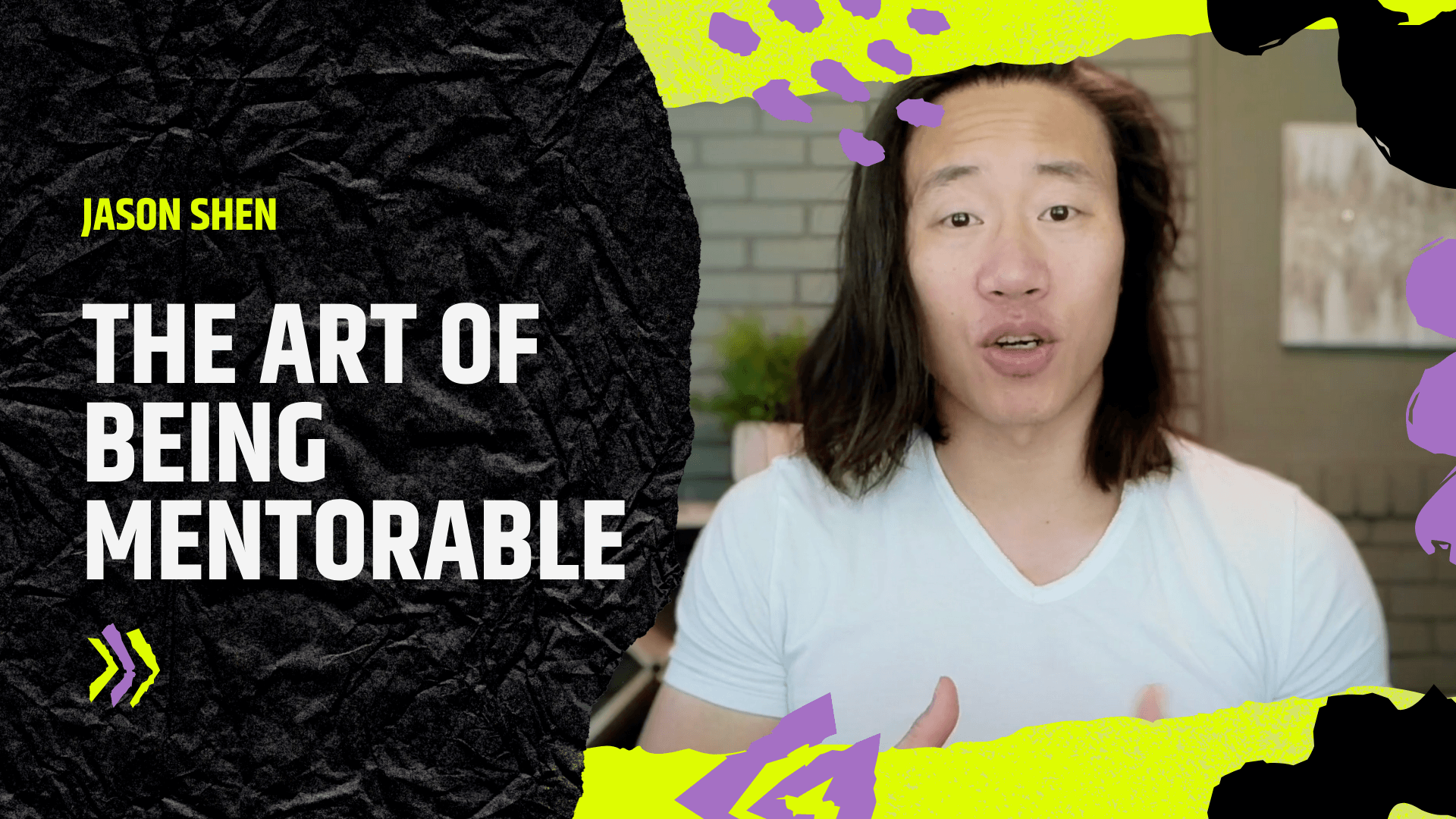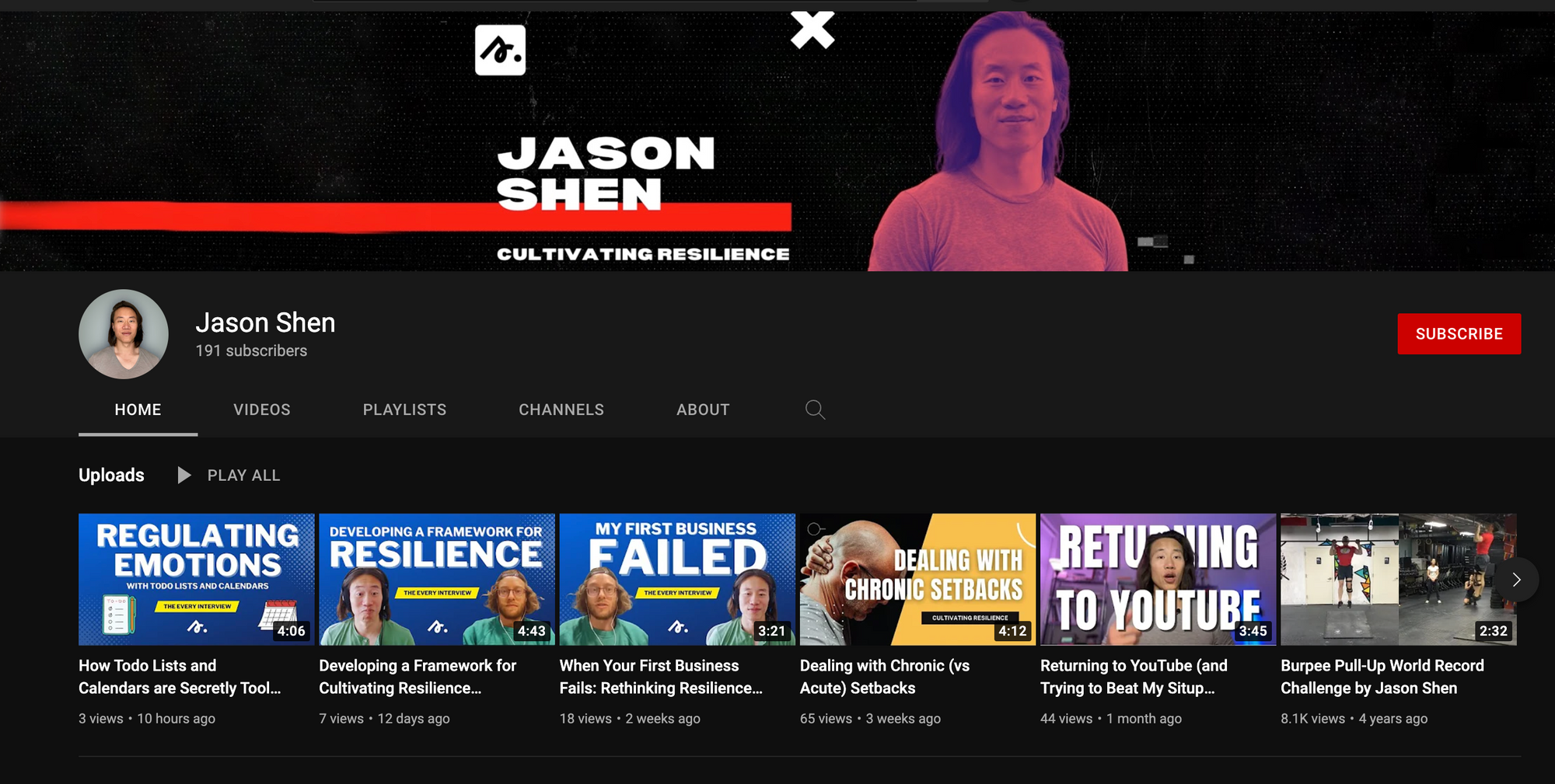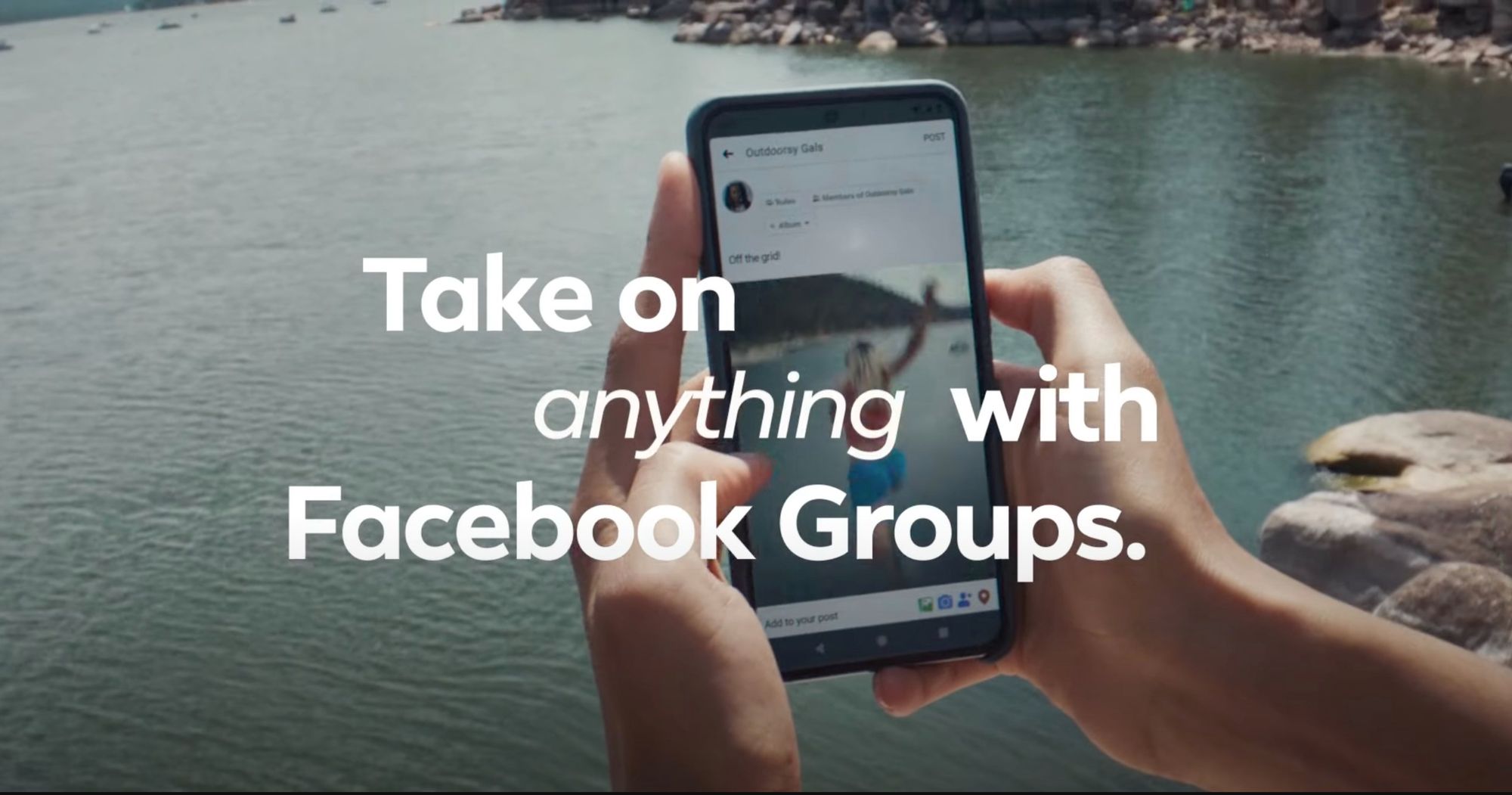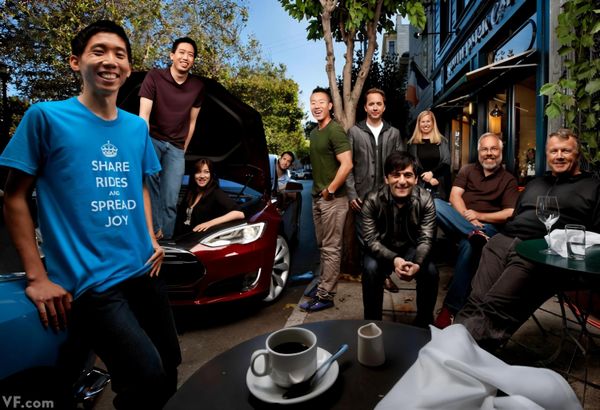10 years ago, Vanity Fair took this shot of me & the Ridejoy team in a Tesla with the founders of Y Combinator & Dropbox at San Francisco's iconic South Park.
It's a badass photo—my brush with Silicon Valley royalty. But it's also bittersweet—because just a month later, my startup would be in big trouble.
My cofounders Kalvin and Randy and I had gone through YC in 2011 and built a long-distance ridesharing marketplace. We left from Demo Day straight to Burning Man, where we used our site to get rides there and back.

We were early into the ridesarhing thing: this was before Lyft existed and Uber was just Travis's fun little app for calling limos for his rich friends. We raised $1.3M & started building a peer-to-peer network of folks driving/ride up and down the West Coast.
Our best source of new users: Craigslist.
We avoided shady tactics and instead provided a valuable service: posting a calendar of rides organized by date, offer or request, and direction (North or South from SF).
Enter the Vanity Fair photoshoot, which happened because there was journalist writing a book about YC (The Launch Pad) and Vanity Fair was publishing an excerpt.
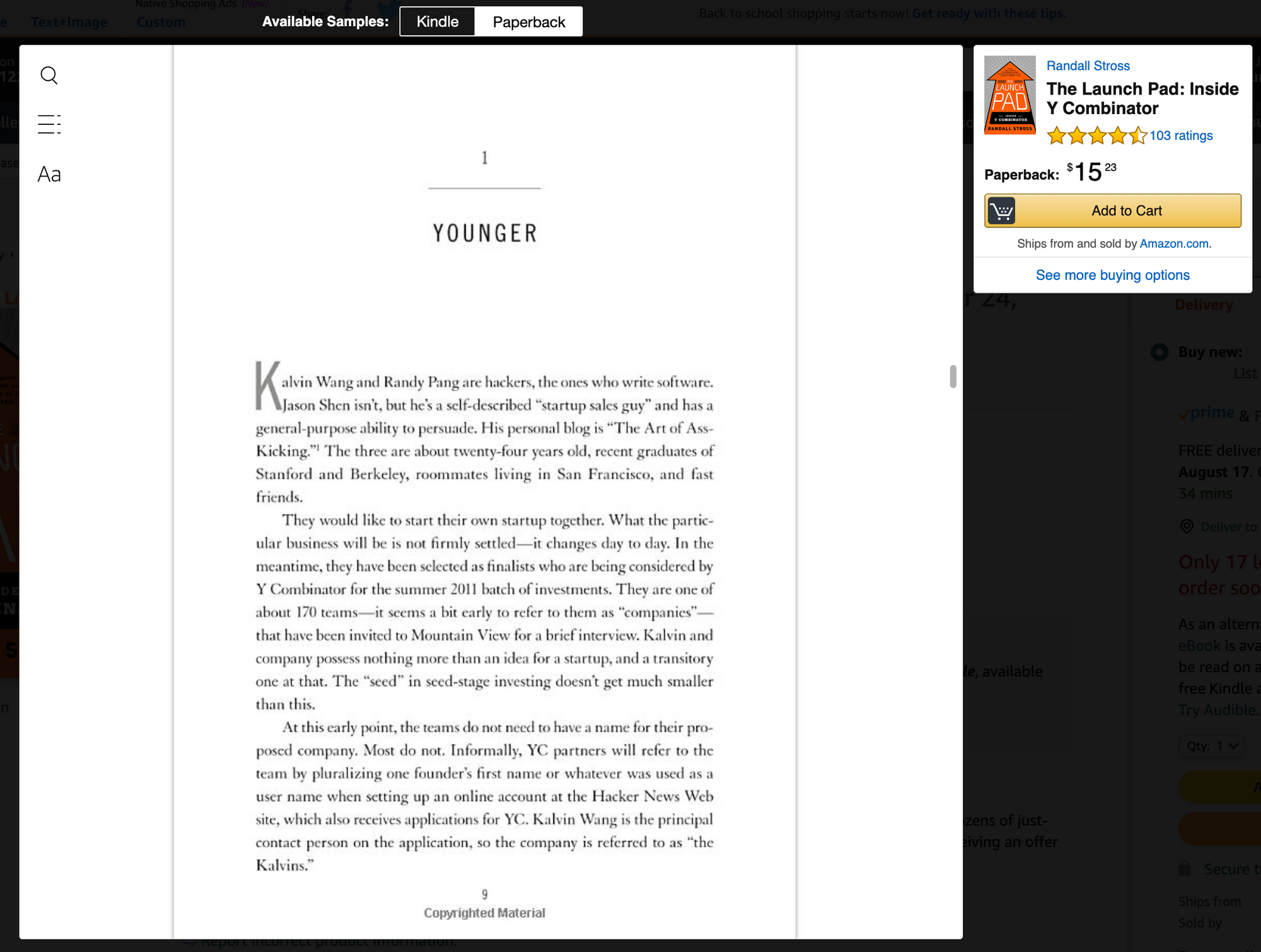
The 1st chapter was literally about how my Ridejoy cofounders & I got into YC so they wanted us in the photo along with our community manager Margot & designer Seth.
Kalvin Wang and Randy Pang are hackers, the ones who write software. Jason Shen isn't, but he's a self-described "startup sales guy" and has a general-purpose ability to persuade. His personal blog is "The Art of Ass-Kicking". The three are about twenty-four years old, recent graduates of Stanford and Berkeley, roommates living in San Francisco, and fast friends.
In Aug 2012, we had just launched our iPhone app to much fanfare and we thought it was going to supercharge our growth.
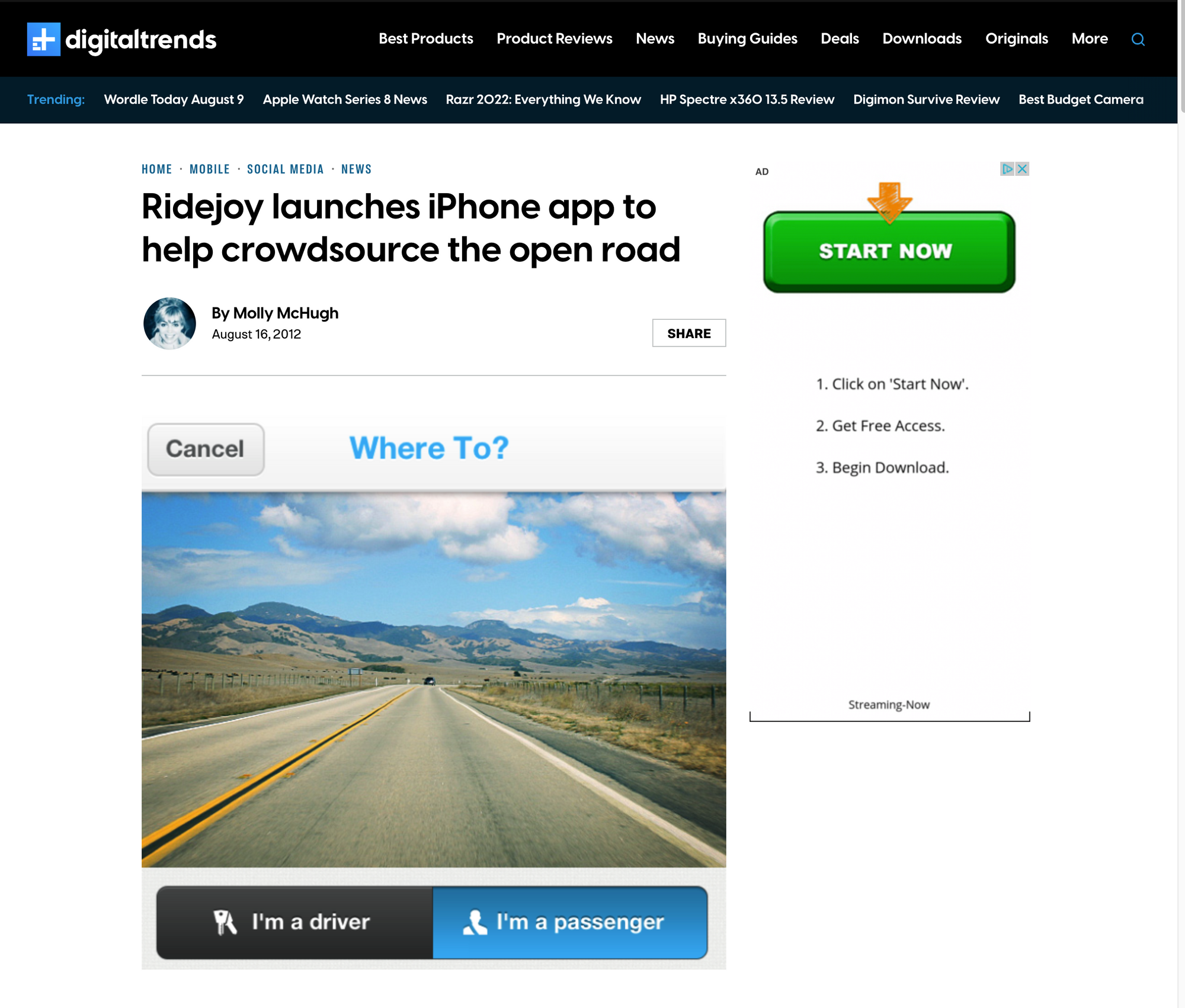
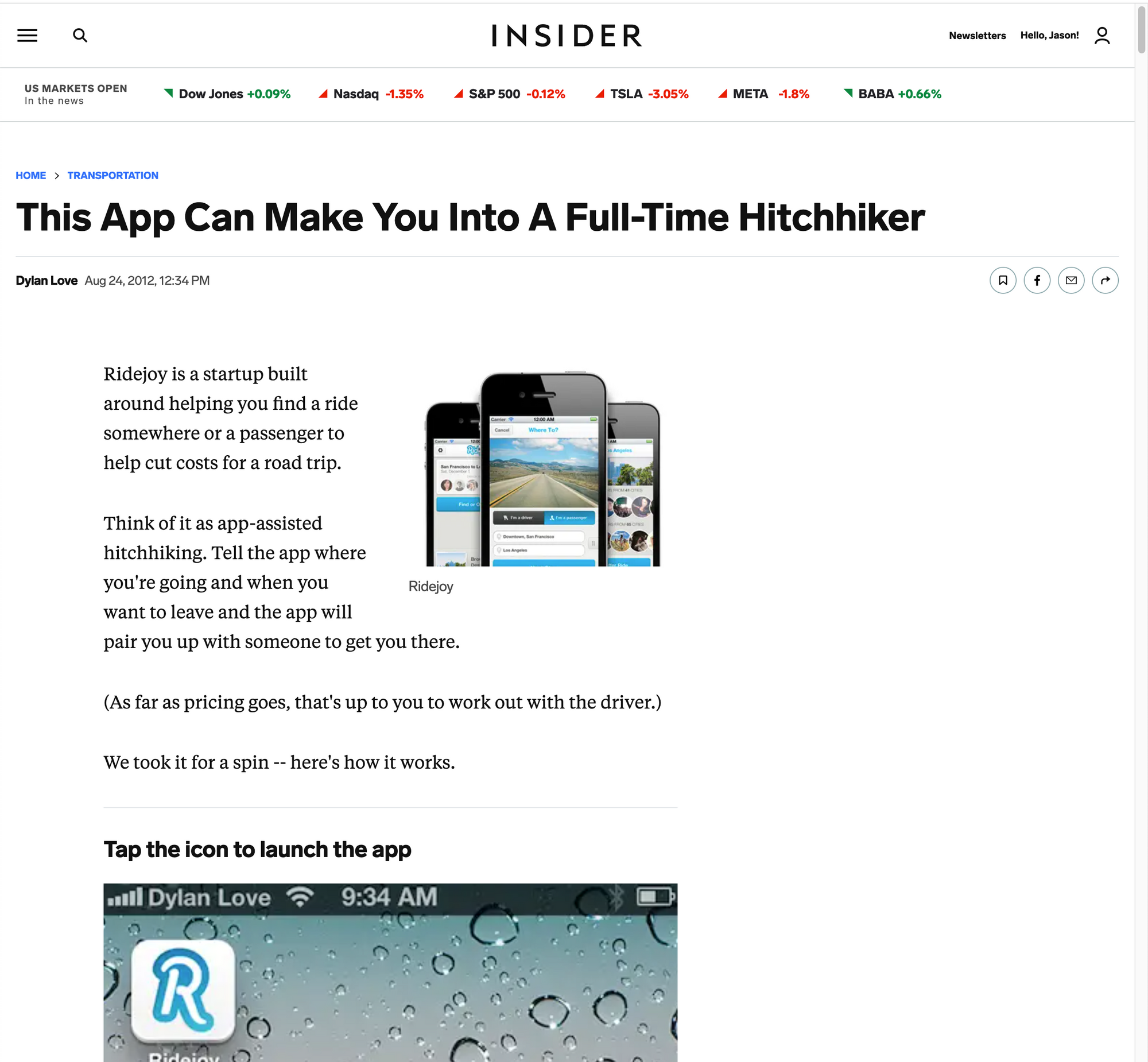
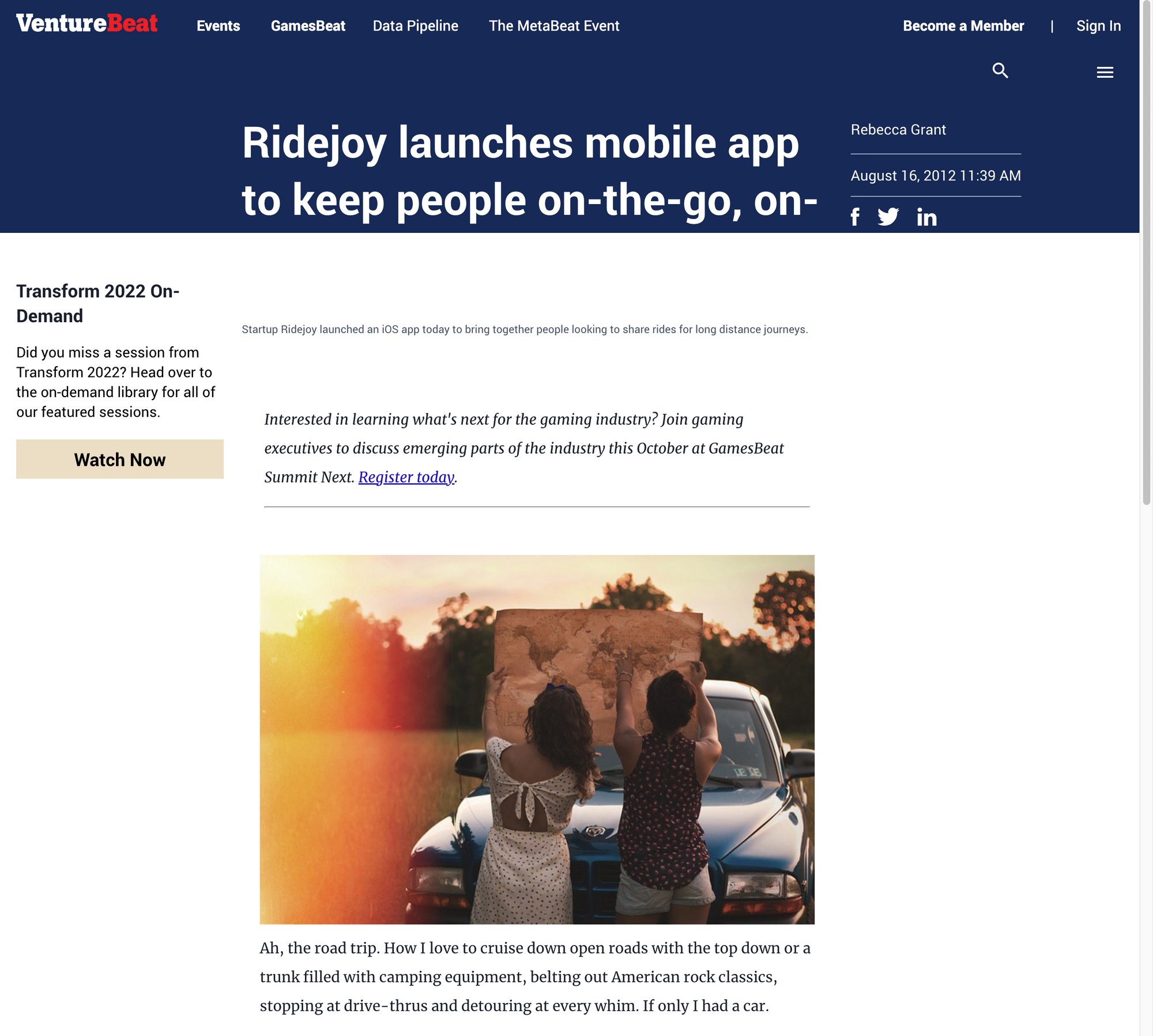
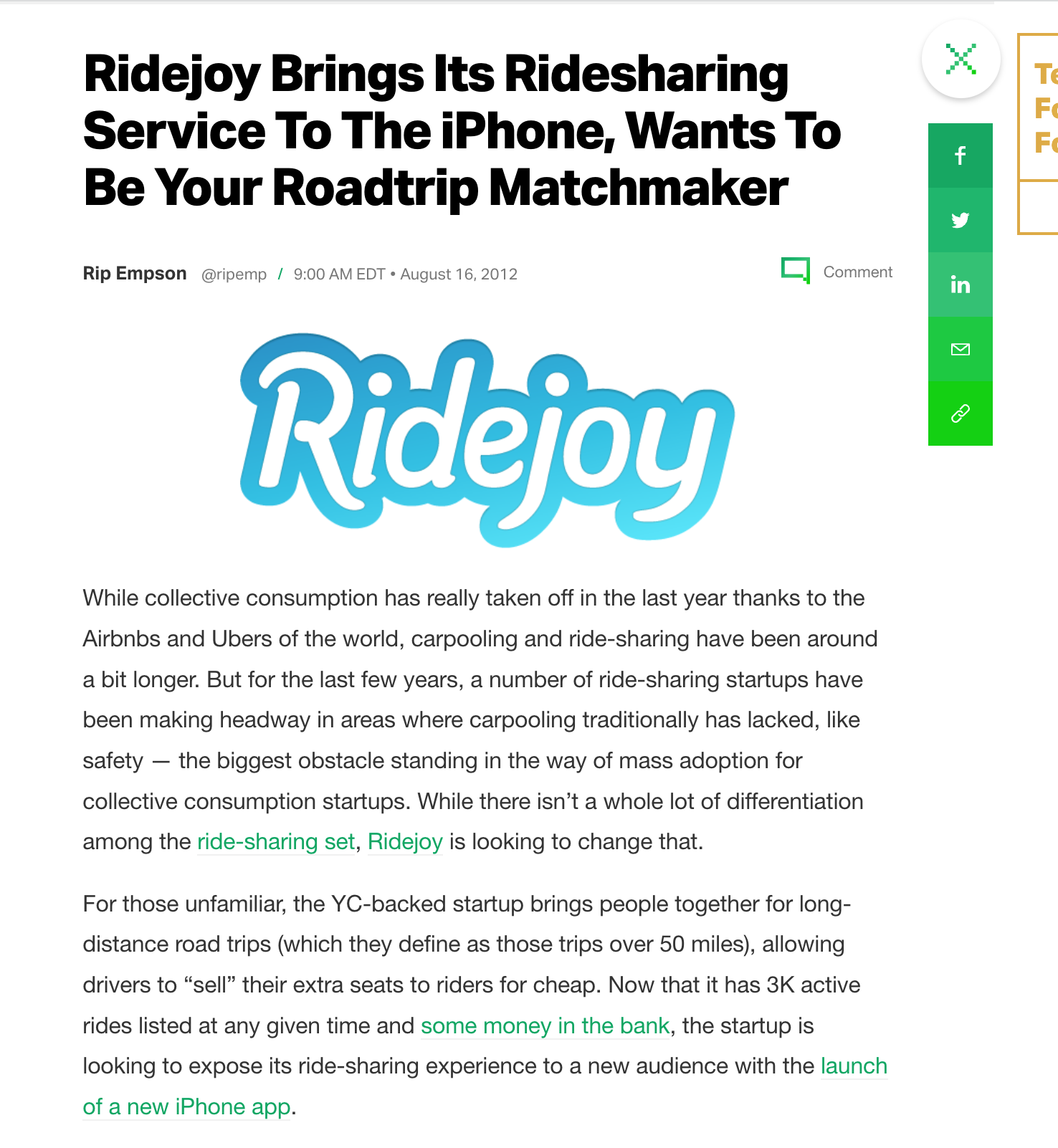
Now we were going to be in a book and in a fucking magazine. We felt on top of the world. But by the time the issue hit stands a month later, we were in the pits.
But one day, CL woke up and chose violence sending cease and desists to us, Yardsale, and most famously Padmapper (which went to court), among dozens of startups trying to eat into its market.
Our YC friends at Yardsale told us they spent $10k on their top-tier law firm seeing if they could fight the cease-and-desist we all got for violating CL's terms of use.
The answer was no. There went 50% of our new user growth.
Worse yet, our iOS app was not a panacea, driving incremental but not exponential growth. We had less than a year of runway left. We had to pivot.
And the worst part were the congrats: "Wow, Vanity Fair! You guys are killing it!
I sent a bunch of issues home to my parents so they could brag to their friends, even as things fell apart internally
Years later, when I interviewed at Y Combinator a second (and later a third time), I saw the photo hanging on its walls. I didn't get in either time.
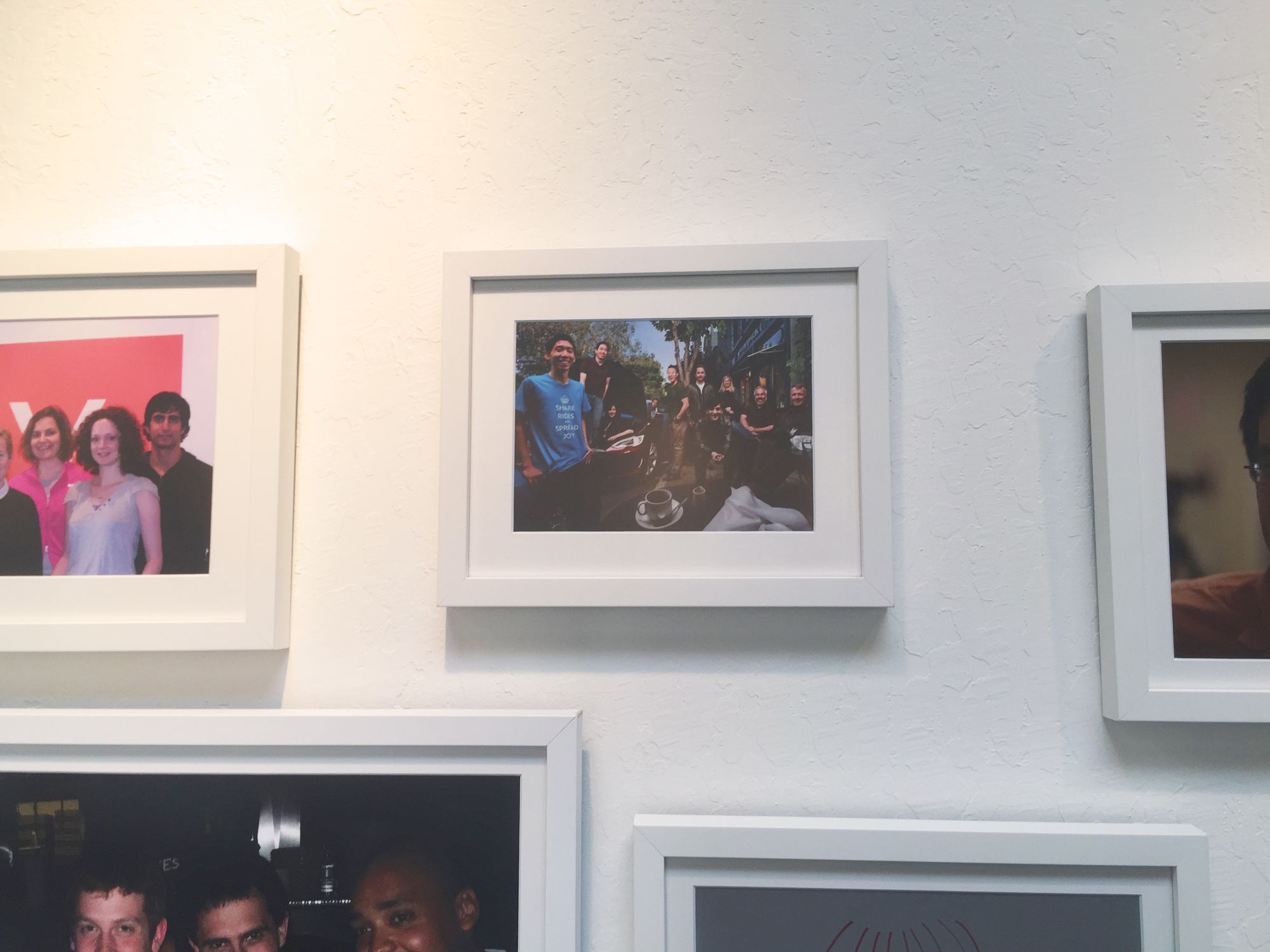
Hopefully you understand why it's such a bittersweet photo. It captures a moment of glory before a rapid downward fall. There we are with legends like Paul Graham, Jessica Livingston, and Drew Houston. Close in proximity yet worlds apart in terms of accomplishment.
The Failed Pivot
Founders hear so many stories about successful pivots.
It’d be easy to think if your co was struggling, all you have to do is pivot!
So here's how our attempt to pivot Ridejoy failed—not because the new direction didn’t work, but because we couldn’t pick one.
After the Craigslist cease & desist, we informed the team of the dire news.We proposed a 2 week sprint where we all worked on different ideas in travel / transportation space and did a little pitch for it at the end.
It was like the format of Shark Tank but the friendly vibes of Great British Bakeoff.


IIRC, the team ended up pitching each other 4 ideas:
- on-demand valet service (a la @luxevalet)
- social trip planning (a la @pilotplans)
- intra-city carpooling to work (what @ridewithvia did at one point)
- rentable RV's parked outside of clubs and conferences (random AF)
My two cofounders & I went home to our shared apt that Friday and talked all weekend. The ideas were all interesting but we didn't LOVE any of them. With a team of 8, we were burning through our cash quickly.
Plus none of our employees had previous startup experience, and everyone seemed rattled by this whole idea of pivoting. They had joined this company to do ridesharing and now it was all changing.
We decided to make the hard call to lay everyone off, preserve our runway and give ourselves time to come up with the new thing. Was this the best idea? Hindsight is 20/20 but that's what made sense.
We told everyone first thing on Monday. Everyone got 3+ weeks of severance.
The next few weeks were a blur. We put Ridejoy development on hold, found someone to sublet our office, and spent all our time back in our apartment trying to come up with the next thing.
We emailed all our investors to let them know. Most were supportive, though one firm asked for their money back. That was a scary moment. We asked for more time to figure things out and eventually got them back off entirely.
They would later claim it was "test" of our commitment.
Over the next 6 months we came up with idea after idea, but nothing stuck.
It felt like going through a breakup and then immediately jumping back into dating. Falling in love with an idea was hard.
Can you tell that we were a team of 3 Missionaries? 😅
Founder motivation tends to come in one of two flavors:
— Jason Shen 🚢 (@JasonShen) August 10, 2022
1. The mission or positive impact their startup could bring
2. The tangible success (financial or otherwise) their startup could bring
When it comes to pivots, knowing your motivation type will affect your approach.
The lowest point was probably when we had a conference call with Garry Tan, then a part-time partner at YC, now a Midas 100 VC, who told us how so many founders "would kill" to be in our position:
- Funded by YC
- With $600k in the bank
- Able to work on any idea they wanted
He told us to go contact a bunch of existing YC companies, ask them what problems their companies have, and build a product to solve them.
So simple! Straight out of the Mercenary playbook.
Mercenaries need to look OUTSIDE.
— Jason Shen 🚢 (@JasonShen) August 10, 2022
What's changing about the world?
What's an overlooked opportunity you could take on?
What's a tedious task or as PG calls a "schlep" people hate dealing with? pic.twitter.com/9ViiC4gx5t
But we wanted to love our idea. And it was hard to find an idea we all loved.
Two of us would get excited about an idea (an inspirational quote site, a platform to pool charitable giving) but the third wouldn't like it.
I was probably the founder with the most Mercenary leanings (30/70 vs 10/90) but as the non-technical founder and not the CEO, I couldn't force us to do anything.
In the end, I was the first to crack. I felt like I was wasting my life away, sitting in an apartment, slowly drawing down our funding to pitch ideas to each other that went nowhere.
I read that Obama was looking for technologists to join @PIFgov and applied on a whim.
To my utter surprise, I got the gig. I would be the 3rd youngest member of a 40 person cohort. It felt like a chance to actually do something meaningful and real. But also spelled the death of the company.
Ironically both Kalvin and Randy would go on to work on the team that rescued Healthcare.gov from utter disaster. So it sort of worked out for the Universe in the end.
Luckily, my cofounders and I are still friends, attended each other's weddings etc and the next company I started 4 years later has a more successful pivot. That's a story for another day.
Further Reading
Recent Issues
